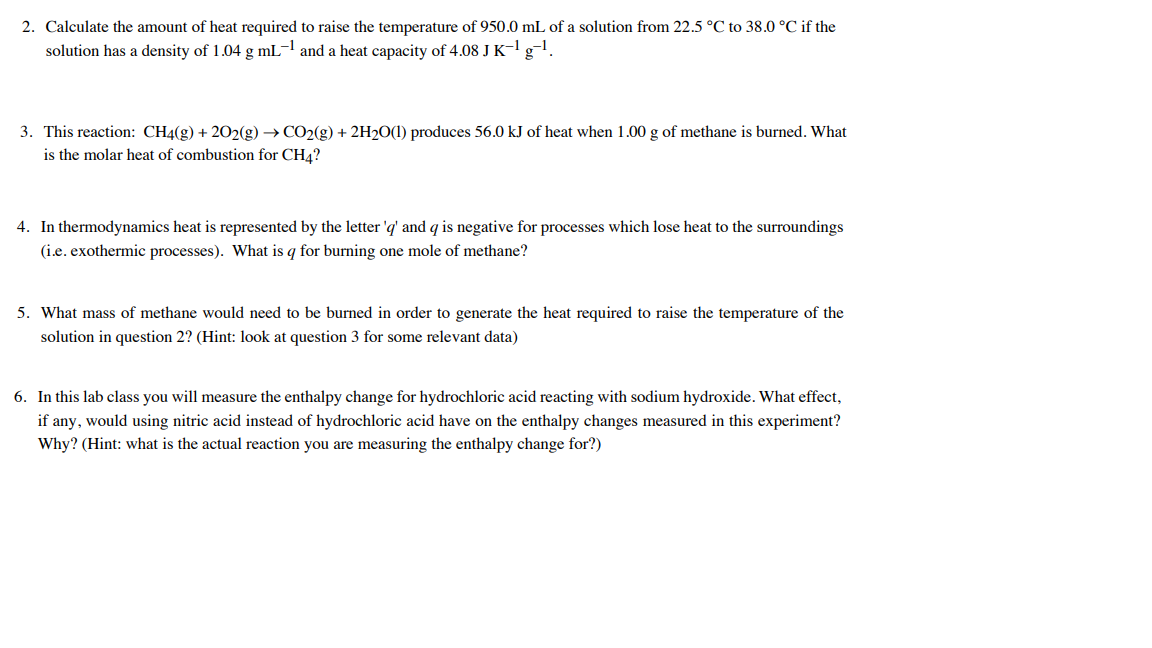2. Calculate the amount of heat required to raise the temperature of 950.0 mL of a solution from 22.5 °C to 38.0 °C if the solution has a density of 1.04 g mLl and a heat capacity of 4.08 J K-l g-l.
2. Calculate the amount of heat required to raise the temperature of 950.0 mL of a solution from 22.5 °C to 38.0 °C if the solution has a density of 1.04 g mLl and a heat capacity of 4.08 J K-l g-l.
General Chemistry - Standalone book (MindTap Course List)
11th Edition
ISBN:9781305580343
Author:Steven D. Gammon, Ebbing, Darrell Ebbing, Steven D., Darrell; Gammon, Darrell Ebbing; Steven D. Gammon, Darrell D.; Gammon, Ebbing; Steven D. Gammon; Darrell
Publisher:Steven D. Gammon, Ebbing, Darrell Ebbing, Steven D., Darrell; Gammon, Darrell Ebbing; Steven D. Gammon, Darrell D.; Gammon, Ebbing; Steven D. Gammon; Darrell
Chapter6: Thermochemisty
Section: Chapter Questions
Problem 6.109QP: A 21.3-mL sample of 0.977 M NaOH is mixed with 29.5 mL of 0.918 M HCl in a coffee-cup calorimeter...
Related questions
Question

Transcribed Image Text:2. Calculate the amount of heat required to raise the temperature of 950.0 mL of a solution from 22.5 °C to 38.0 °C if the
solution has a density of 1.04 g mL-l and a heat capacity of 4.08 J K-l g.
3. This reaction: CH4(g) + 202(g) → CO2(g) + 2H2O(1) produces 56.0 kJ of heat when 1.00 g of methane is burned. What
is the molar heat of combustion for CH4?
4. In thermodynamics heat is represented by the letter 'q' and q is negative for processes which lose heat to the surroundings
(i.e. exothermic processes). What is q for burning one mole of methane?
5. What mass of methane would need to be burned in order to generate the heat required to raise the temperature of the
solution in question 2? (Hint: look at question 3 for some relevant data)
6. In this lab class you will measure the enthalpy change for hydrochloric acid reacting with sodium hydroxide. What effect,
if any, would using nitric acid instead of hydrochloric acid have on the enthalpy changes measured in this experiment?
Why? (Hint: what is the actual reaction you are measuring the enthalpy change for?)
Expert Solution
This question has been solved!
Explore an expertly crafted, step-by-step solution for a thorough understanding of key concepts.
Step by step
Solved in 2 steps

Knowledge Booster
Learn more about
Need a deep-dive on the concept behind this application? Look no further. Learn more about this topic, chemistry and related others by exploring similar questions and additional content below.Recommended textbooks for you

General Chemistry - Standalone book (MindTap Cour…
Chemistry
ISBN:
9781305580343
Author:
Steven D. Gammon, Ebbing, Darrell Ebbing, Steven D., Darrell; Gammon, Darrell Ebbing; Steven D. Gammon, Darrell D.; Gammon, Ebbing; Steven D. Gammon; Darrell
Publisher:
Cengage Learning

Chemistry: Principles and Reactions
Chemistry
ISBN:
9781305079373
Author:
William L. Masterton, Cecile N. Hurley
Publisher:
Cengage Learning

Chemistry & Chemical Reactivity
Chemistry
ISBN:
9781337399074
Author:
John C. Kotz, Paul M. Treichel, John Townsend, David Treichel
Publisher:
Cengage Learning

General Chemistry - Standalone book (MindTap Cour…
Chemistry
ISBN:
9781305580343
Author:
Steven D. Gammon, Ebbing, Darrell Ebbing, Steven D., Darrell; Gammon, Darrell Ebbing; Steven D. Gammon, Darrell D.; Gammon, Ebbing; Steven D. Gammon; Darrell
Publisher:
Cengage Learning

Chemistry: Principles and Reactions
Chemistry
ISBN:
9781305079373
Author:
William L. Masterton, Cecile N. Hurley
Publisher:
Cengage Learning

Chemistry & Chemical Reactivity
Chemistry
ISBN:
9781337399074
Author:
John C. Kotz, Paul M. Treichel, John Townsend, David Treichel
Publisher:
Cengage Learning

Chemistry & Chemical Reactivity
Chemistry
ISBN:
9781133949640
Author:
John C. Kotz, Paul M. Treichel, John Townsend, David Treichel
Publisher:
Cengage Learning

Chemistry
Chemistry
ISBN:
9781305957404
Author:
Steven S. Zumdahl, Susan A. Zumdahl, Donald J. DeCoste
Publisher:
Cengage Learning
